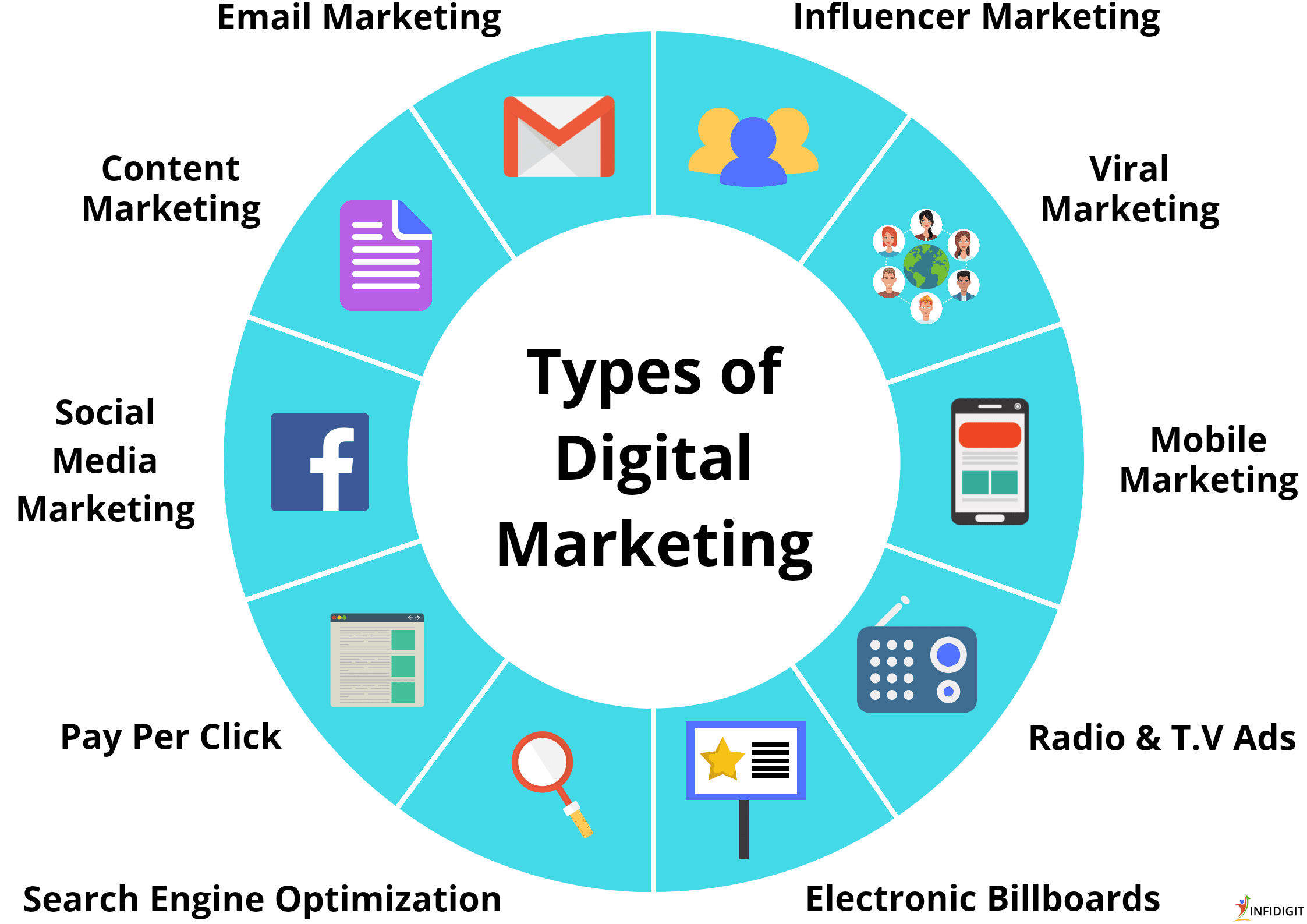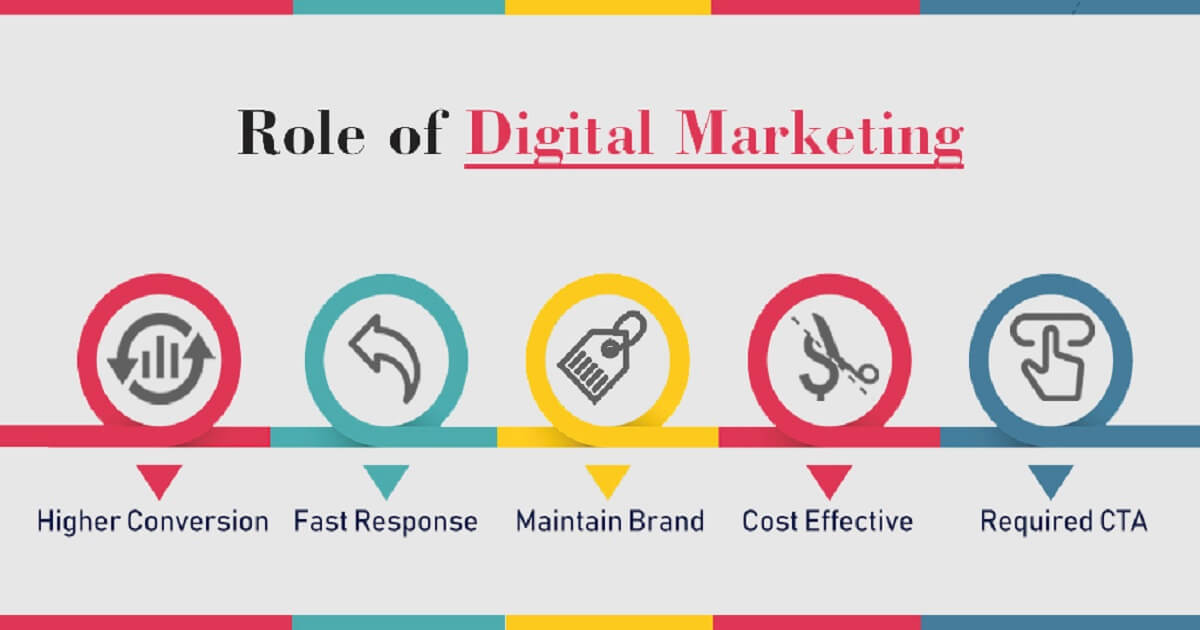Digital marketing is a broad term that encompasses various online strategies and channels used by businesses and organizations to promote their products, services, or brand to a digital audience.Digital marketing, also called online marketing, is the promotion of brands to connect with potential customers using the internet and other forms of digital communication. This includes not only email, social media, and web-based advertising, but also text and multimedia messages as a marketing channel. Here is an overview of digital marketing:
1. Types of Digital marketing:
Marketing Analytics: Using data and analytics tools to track and analyze the performance of digital marketing campaigns, helping businesses make data-driven decisions and optimize their strategies.
Video Marketing: Creating and promoting video content on platforms like YouTube, TikTok, and social media to engage and connect with the audience visually.
Mobile Marketing: Tailoring marketing efforts specifically for mobile devices, including mobile app advertising, SMS marketing, and optimizing websites for mobile users.
Content Marketing: This strategy involves creating and distributing valuable and relevant content to attract and engage a target audience. It aims to build trust and brand loyalty.
Affiliate Marketing: In this approach, businesses partner with affiliates who promote their products or services. Affiliates earn a commission for each sale or lead generated through their marketing efforts.
Influencer Marketing: Collaborating with influencers in a specific niche or industry to promote products or services to their followers. This leverages the influencer’s credibility and reach.
Social Media Marketing: Utilizing social media platforms like Facebook, Instagram, Twitter, and LinkedIn to connect with the audience, build a brand presence, and run targeted ad campaigns.
Email Marketing: Sending personalized and targeted emails to nurture leads, maintain customer relationships, and drive conversions.
Search Engine Optimization (SEO): Optimizing website content and structure to rank higher in search engine results pages (SERPs) organically. This improves visibility and drives organic traffic.
Pay-Per-Click (PPC) Advertising: Running paid advertising campaigns on search engines like Google and social media platforms. Advertisers pay a fee each time their ad is clicked, driving immediate traffic.
Online Public Relations (PR): Managing and enhancing the online reputation and public relations of a business through digital channels, including social media, online reviews, and online news outlets.
These are the major types of digital marketing strategies used by businesses to connect with their target audiences and achieve various marketing objectives.
2. Challenges in Digital Marketing:
Managing your marketing budget: Allocating and optimizing budget resources effectively can be a significant challenge, especially for small businesses with limited resources.
Getting lost in the crowd: With a vast online presence, it can be challenging for businesses to differentiate themselves and capture their target audience’s attention.
Generating traffic and leads: Attracting a consistent flow of high-quality traffic and converting them into leads or customers requires a well-executed strategy.
Optimizing ROI (Return on Investment): Calculating and maximizing the return on investment for digital marketing efforts is often complex, as it involves tracking various metrics and attributing conversions to specific channels or campaigns.
Omnichannel marketing: Ensuring a cohesive and seamless customer experience across multiple digital channels and touchpoints can be demanding but is essential for success.
These challenges highlight the complexity and dynamic nature of digital marketing. Overcoming them requires businesses to stay updated with industry trends, adapt to changes, and implement effective strategies.
3. Purpose of Digital Marketing:
Lead Generation: Digital marketing is used to generate leads, capturing potential customers’ interest and contact information to nurture them into paying customers.
Customer Retention: It helps in retaining existing customers by providing them with valuable content and offers, ensuring their loyalty to the brand.
Cost-Effective: Digital marketing can be more cost-effective than traditional advertising methods, allowing businesses to reach a broader audience within their budget.
Global Expansion: It enables businesses to expand their reach globally, breaking down geographical barriers and targeting international markets.
Real-Time Interaction: Digital marketing allows real-time interaction with the audience, enabling businesses to respond to customer queries and feedback promptly.
Competitive Advantage: It provides a competitive advantage by staying ahead of competitors and adapting to industry trends faster.
Personalization: Digital marketing allows for personalized marketing messages and offers tailored to individual customer preferences.
Measurable Results: Businesses can track and measure the effectiveness of their digital marketing campaigns, making data-driven decisions to optimize their strategies.
Digital marketing serves as a versatile and essential tool for businesses to achieve various objectives, from expanding their reach to increasing sales and fostering customer relationships.
Conclusion:
In summary, digital marketing encompasses a wide range of strategies and tactics designed to leverage the digital landscape for business growth and success. It’s essential for businesses to understand the various digital marketing avenues and adapt to the ever-evolving digital landscape to remain competitive.
🌐 External Links
- Investopedia – Digital Marketing Overview
- SNHU – What Are the 8 Types of Digital Marketing?
- Simplilearn – 9 Types of Digital Marketing: When and How to Use Them?
FAQ’s
- What are the 7 C’s of digital marketing?
And a great approach to take is to implement the 7 Cs- customer, content, context, community, convenience, cohesion, conversion. FAQ’s: What are 7 C’s of marketing? Customer, content, context, community, convenience, coherence, and conversion are the 7 Cs of digital marketing.
2. What are the 5 key of digital marketing?

In order to maximize engagement, your website should follow best practices such as being responsive, mobile friendly and easy to navigate with clear calls-to-action. In addition, your website should contain a blog that shares engaging, relevant and educational content on a consistent basis.
How can I earn money from digital marketing?
These are the most popular methods to make money with digital marketing.
- Make money as a content writer.
- Become an SEO expert and sell SEO services.
- Earn money with affiliate marketing.
- Sell consulting services to companies.
- Earn money by selling ads.
- Work as a social media manager.
- Create and sell your own digital products.



